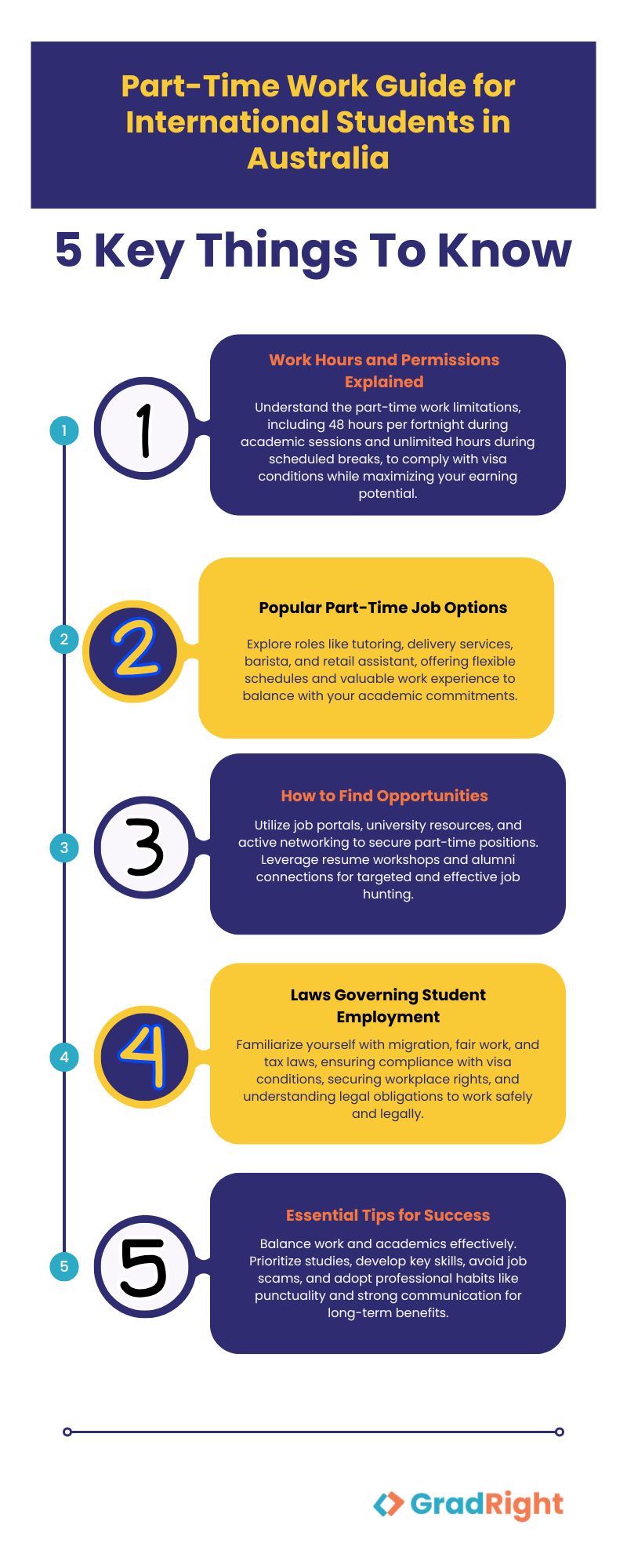Part-Time Jobs in Australia for International Students: Opportunities, Requirements, and Tips
As an international student, you’re eligible to work a certain number of hours per week, which helps you earn extra income alongside studying in Australia. Doing a part-time job also helps you gain valuable work experience, which makes you job-ready right after college in Australia.
In Australia, international students pursuing education under subclass 500 are usually allowed to work up to 48 hours per fortnight during the academic period. The best part? The students are allowed to work full-time during semester vacations or holidays, which can help them earn extra income and pay for their expenses while studying.
However, the condition is that you must comply with the work limitations, as it is the most critical step to keep your study visa valid in Australia.
In this guide, we will be taking you through some information on part-time work for international students studying in Australia and how to find it. Keep reading to find out.

Part-time work permissions on Australian student visa
So, if you are an international student in Australia and willing to work part-time, then there are specific work permissions you should have. They are listed below.
Work Hours During Study Periods
As an international student in Australia, you can work part‐time only up to 48 hours per fortnight alongside studying. A fortnight is a period of 14 successive days in which you can distribute work time in whichever way you see fit, as long as the sum does not exceed 48 hours.
This limit provides a degree of flexibility, allowing students to focus on academic work loads while gaining practical work experience.
Work Hours During Scheduled Breaks
International students are allowed to work as many hours as they really want during the off-hours, for instance, during semester breaks or mid-year breaks.
With these breaks, there is a fantastic chance to work full-time or on extra shifts; these opportunities enable students to earn money, gain even more experience, and venture into possible job sectors. However, the time for scheduled breaks is mostly based on your academic calendar, and you must get permission before doing work during scheduled breaks. You cannot proceed to work without proper permission from the university concerned.
Postgraduate Research Students
For students studying for a master’s or doing research or a doctoral degree program, the regulations are more flexible in terms of weekly work hours. Postgraduate research students are free to work as much time as they like once their course of study begins.
The design of this flexibility is to fit the demanding practice of research work, which is frequently combined with professional development and often includes paid academic activities (e.g., teaching or research assistance).
But, students must not let the work impact their delivery of assignments or do excessive work outside of academics.
It’s crucial to adhere to these work limitations to maintain compliance with your visa conditions. If you exceed the permitted work hours, then it can also lead to visa breaches, and your visa may even get canceled.
Here are some more important conditions you must abide by while studying in Australia:
- The first rule is that students cannot start working until they have officially commenced their course of study. This means that they must wait until the first day of classes before taking up any employment.
- Secondly, students must remain enrolled in their course and meet satisfactory attendance and progress requirements to retain their work rights,
- International students must apply for a Tax File Number to work legally in Australia. This should be done online.
Also, while you are working in Australia, you are entitled to workplace rights and protections as all employees. So make sure you receive at least the minimum wage and fulfill all your employee legal obligations.
How to find part-time work in Australia
Finding work in Australia is quite easy compared to other countries like the USA and the UK. Now that you are well aware of the conditions required to get part-time employment for international students working in Australia, let us understand some ways to get one.
Use Online Job Portals
There are several platforms that offer part-time job listings across various industries. These platforms are SEEK, Indeed Australia, and Linkedin. Look for entry-level jobs and keep networking with industry leaders and, eventually, potential employers.
Use University Resources
There are many resources in the university that you can seek help from, such as college job boards, alumni networks, etc. You can also join resume workshops and participate in regular interview preparation sessions.
There are several on-campus employment positions, such as library assistants, research aides, and several other administrative roles in the university, that you can take up during the course of study.
Network Actively
It’s always best to meet people from different industry levels, including alumni, to understand what’s going on in the job market and if there’s any specific skill set required to get into the desired industry. This way, you can make yourself known and opt for any upcoming job opportunity suited to your requirements.
Prepare your Application Materials
It’s best to keep your application materials ready and well-arranged. These applications include a resume, cover letter, and visa documents.
By following these steps and utilizing available resources, you can effectively find part-time employment that complements your studies and enriches your Australian experience.
What laws apply to international students working while studying in Australia?
As an international student in Australia, it’s very important to get a hold of legal frameworks that govern your employment, ensure compliance, and protect your rights. Some of the key laws and regulations that apply to students working in Australia are:
1. Migration Act 1958 and Migration Regulations 1994
Migration Act 1958 and Regulation Law 1994 outline the conditions of your Student visa (subclass 500), including the limitations that are applied to professionals in Australia.
- If you are studying in Australia, then you are permitted to work up to 48 hours per fortnight while your course is in session.
- While studying, if you are facing official course breaks, then you are allowed to work unlimited hours.
As an international student, you have to adhere to these conditions. However, if you violate it, then there’s a chance that your visa could get canceled, and you might face potential deportation.
2. Fair Work Act 2009
The Fair Work Act is a law that is applicable to all workers in Australia. It includes international students, which includes fair pay and conditions for all students and workers. Some of the key provisions involve::
- Minimum Wage: As of July 2023, the national minimum wage is AUD 24.10 per hour, as stated by the Fair Work Ombudsman.
- Workplace Rights: Also within this law, you are entitled to a safe work environment, appropriate rest breaks, and protection from unfair dismissal.
3. Taxation Laws
As an employee, you are also subjected to Australian tax laws. Within this law, you have to
- Obtain a TFN to work legally and ensure correct taxation in order to work and stay in Australia.
- Employers within these laws are also required to contribute to your superannuation (retirement fund) if you earn over a certain threshold.
4. Workplace Health and Safety (WHS) Laws
Workplace laws mandate that every employer must provide a safe working environment for students. You have the right to:
- Safe Conditions: Work in an environment free from hazards.
- Training: Receive adequate training to perform your job safely.
5. Anti-Discrimination Laws
Under the Racial Discrimination Act 1975 and other relevant legislation, you are protected from discrimination based on race, color, national origin, sex, or other protected attributes.
6. Industrial Relations Laws
These laws govern the relationship between employers and employees, including:
- Employment Contracts: Ensure you receive a written agreement outlining your terms of employment.
- Collective Bargaining: Understand your rights regarding union membership and collective agreements.
Popular part-time jobs in Australia for International students
Now that you understand the laws and regulations involving part-time jobs as an international student in Australia, Now, you may wonder what are some of the popular part-time jobs for international students in Australia. They are:
Tutoring
You can work as an individual tutor or sign up on SEEK. You can create study plans, help students understand problems, and improve their grades.
Delivery Person
You can work for restaurants, warehouses, or post offices. You can use a bike or car to deliver packages and food.
Server or Waiter
You can work in local restaurants or diners. You usually don’t need any specific qualifications, and you’ll receive on-the-job training.
Barista
This is a popular choice because it’s not as demanding as other part-time jobs.
Teaching Assistant
You can help teachers and professors conduct classes and oversee students during activities.
Retail Assistant
You can handle payments, restock shelves, clean, and provide customer service.
Salesperson
You can drive sales and revenue for a product-based business.
Things to remember when searching for part-time jobs in Australia
Finding part-time employment in Australia can be a rewarding experience, but it requires preparation and awareness. Here are some key things to remember:
1. Understand Visa Work Limitations
As an International student, you must know that you can work up to 48 hours per fortnight during academic sessions and unlimited hours during holidays. Not abiding by this can lead to legal actions taken against you. So, always remember to keep yourself updated on the visa work limitations.
2. Be Flexible and Open-Minded
Many jobs don’t require prior experience, so always be honest about your experience and start afresh with minimum experience. Have curiosity and determination to work and study side-by-side while enhancing your skill set.
3. Avoid Scams
Be cautious of jobs offering unrealistic pay or asking for upfront fees. Always check the legitimacy of the employer and avoid sharing personal information unless necessary.
4. Develop Necessary Skills
Working in Australia requires good to great English communication skills from the students. So, practice strong communication skills, which are essential for most roles.
For example, these skills are very important in some of the jobs, like retail and hospitality jobs, and will require experience in handling customer interactions. Also, consider online certifications for roles in IT, freelancing, or specialized fields.
5. Prioritize Your Studies
Balance both work and academics, and make sure your part-time job doesn’t interfere with your studies. As your first goal in Australia is to study, always keep that thing in mind. It’s advisable to use tools like calendars or apps to manage your schedule effectively.
6. Be a Professional
In Australia, you get rewarded for demonstrating habits like punctuality of time, good appearance, enthusiasm, and willingness to learn. Always show a good attitude towards work and learning. It will take you to places and open up several opportunities for you.
All these tips will serve you well when you begin working part-time in Australia. But before you get there, let’s talk about an equally important part of your journey—getting into the right university and securing the right education loan.
How to make your Australian study experience a high ROI one?
Many students rely on advice from the internet, peers, seniors, or even family members to pick a university. Often, they choose an institution simply because someone they know went there. While this might seem like a safe choice, it means you’re missing out on better opportunities that might align more closely with your goals.
This is where GradRight’s university-search platform steps in:
- It uses 100% AI-powered shortlisting to give you personalized university recommendations.
- It considers 8 million data points, including placement rates, alumni networks, ROI, and scholarships.
- Instead of guesswork, you make a confident, informed choice tailored to your academic and career goals.
With GradRight, you can be sure you’re choosing a university that’s truly the right fit for you.
When it comes to financing, most students visit two or three local bank branches, compare interest rates, and settle for what seems acceptable. This leaves out a huge portion of the market and potential loan options that could save you money and offer better terms.
GradRight’s loan-search platform simplifies this process:
- Over 15 trusted lenders, including banks and NBFCs, compete to offer you the best loan terms.
- The entire process is fully online, with no paperwork or bank visits required.
- You get access to collateral-free options and low-interest rates tailored to your needs.
- The platform is 100% free for applicants and ensures a fast, secure loan disbursement.
With GradRight’s loan-search platform, you save time, money, and effort—allowing you to focus on preparing for your studies in Australia.
FAQs
1. How much can an international student earn in Australia part-time?
International students in Australia with no immigration restrictions are able to work part-time and typically earn a minimum hourly rate of AUD 24.10 for on-campus jobs. So, for example a student working for maximum allowed hours (48 hours per fortnight during academic sessions) can earn approximately AUD 1,115 every two weeks, before taxes.
2. Is it easy for international students to get a part-time job in Australia?
Although competition for part-time work may be high, part-time job opportunities abound in areas such as retail, hospitality, and delivery work. Success depends on your approach, including having a tailored resume, applying early, and leveraging job boards like SEEK or Indeed. Networking, local group membership, and career services offered by the university are all potential sources of added leverage.
3. Can I work 40 hours a week as an international student in Australia?
No, international students on a Student Visa (subclass 500) are only permitted to work up to 24 hours per week during term time (i.e., up to 48 hours per fortnight). Nevertheless, students are provided with the opportunity to work full-time, including 40+ hours per week, during semester breaks or holidays.
4. Which city has the most part-time jobs in Australia?
As the major cities (Sydney, Melbourne, and Brisbane) have a larger population, a vibrant hospitality industry, and a broad range of industries, they have the highest number of part-time job opportunities. Sydney is well known for retail and tourism jobs, whereas Melbourne is the city of creative and technology careers.
5. What is the highest-paid part-time job in Australia?
Skilled part-time work such as tutoring, IT support, freelance design, or skilled trades can provide pay rates that are higher per hour, AUD 30 to 50 for an hour or more. Furthermore, work in areas such as aged care, personal training, and property agent assistance can provide significant income streams for suitably qualified and experienced people.


















